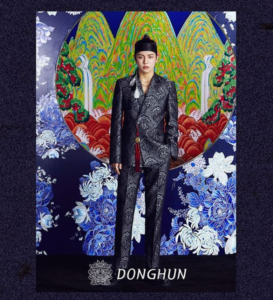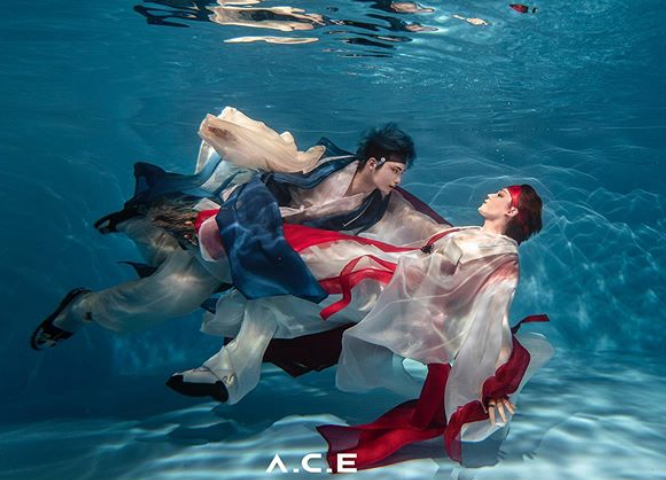“No one saves us but ourselves. No one can and no one may. We ourselves must walk the path.”
-Siddhartha Gautama, the Buddha

While this quote is from an entirely different century, it highlights an important view of fate: fluid and powerful. Some view fate, luck, and chance as ethereal predetermined paths decided by the universe, but often fate can also be born out of our own desires, impulses, and decisions in life. In A.C.E.’s newest mini-album, HJZM: The Butterfly Phantasy, the members capitalize on these elusive, sometimes otherworldly deciders of existence and urge us to take control of our own destinies.
Rather than risking controversy, by fate here I simply mean the generally agreed upon predestination many suppose could exist; whether it’s changeable, from a higher power, or completely of devoid agency at all, is inconsequential to its personifications in the album. With that being said, the title track “도깨비” or “Favorite Boys” is about being reborn as someone’s ideal type in an imagined world while “Clover,” “Stand by You,” and “Golden Goose” flirt with fate in other ways, urging Choice (the fandom) to run forward with them and decide their own path.
Just to get this out of the way, the title track “Favorite Boys” could be construed as a bit inappropriate. It seems to draw upon a Taoist allegory called “The Butterfly Dream” and while the MV does provide a disclaimer at the beginning that all depictions are imagined, the imagery, styling, and even name of the album all evoke aspects of the story and are hard to ignore.
In “The Butterfly Dream,” the writer Zhuang Zuo imagines himself as a butterfly and upon his awakening, ponders if he is truly awake, and remarks on the overlapping fissures of dreams and reality. Likewise, the members in the MV describe the song as a rebirth into a strange world (a dream perhaps?) in which they take on the likeness of an “ideal type.” This in turn manifests as 도깨비, or goblins, that boast otherworldly visuals and often magical powers as well. While the allusion is likely used to create a connection with their fusion traditional/modern concept, the use of a foundational religious text could be construed as cultural appropriation by some. I would like to give them the benefit of the doubt, and I actually quite like the song it its own right. And without considering the broader socio-cultural implications, the visuals are really breathtaking. However, the boys walk a thin line between appreciation and appropriation, a concept K-pop seems to be grappling with more than ever as of late.
In the wider scope of the album, “Favorite Boys” is a no-nonsense, break-the-rules celebration of acting on your desires, tempting fate, and forging forward apologetically. Just as Zhuang Zuo explores the sometimes-elusive differentiation between being awake and asleep, the boys draw upon this notion to bring magic and chosen destiny into real life. Using unearthly visuals and allusions to death and the afterlife, A.C.E. urge fans to cast aside “dreams” and make them reality — a message that resonates throughout the album.
Tangential to “Favorite Boys” is the song “Golden Goose.” Originally a fable written by Aesop, the story is about a man who possessed a magical goose that could lay golden eggs. After becoming impatient that he was not getting rich fast enough, he decided to cut open the goose to get all of its eggs at one time. However, he instead finds no eggs, and his magical goose is now dead.
While the underlying message of the fable is lost in its transfer to this song, the allure of aggressive desire for something we don’t possess, while blind to potential dangers, is no less prevalent. Musically, “Golden Goose” is one of the heaviest and most rap-centric tracks on the album, relying on trap stylings and a dizzyingly busy musical accompaniment. Loud, boisterous, and carnal-sounding, the track is a musical parallel to the intense desire of the countryman in Aesop’s fable.
Taking a complete 180 are the songs “Clover” and “Stand By You.” “Clover,” written by the leader Jun, is a tribute to fans who continue to show love and gratitude. While the songs only loosely relate to the tempting-fate paradigm of the rest of the albums on the album, the songs function more as an epilogue or damage control. They are comforting and warm, providing relief to both A.C.E. and Choice alike. To me, the members seem to be communicating that no matter what happens (or whatever respective fallout could ensue), they can find comfort in mutual connection and love. “Clover” capitalizes on how thankful and lucky the members feel to have fans that continue to stay by their side. While it’s a simple song in construction, the lyrics are deep and meaningful, with effective, mostly pop ballad-style music to complement it.
“Stand By You” is also comforting but also arguably even more deep. Rather than a simpler “thank you”, “Stand By You” is an intensely emotional retelling of the close relationship the members feel that they have with fans and their desire to be together through both good and bad times- a symbiotic relationship of support and love. Not to be overly personal, but the first watch through had me in tears. The song is beautifully constructed, capitalizing on the vocal prowess of the members to create a thick soundscape of harmony and peak softness. If you watch through the music video, spoiler alert, there is actually a twist at the end in which the members maybe never existed at all. The girl in the video instead finds comfort in their memories, warmth, and music. A breathtaking song, beautiful scenery, and warm MV overall create an emphatic and emotional track that rounds out the rest of the album. So, while the members urge us to fight for our own desires, they also provide comfort when things might not go as planned.

The one track that does not seem to fit is “Baby Tonight.” Sure, it’s sensual and urging, but does it tempt fate? I am not so sure. I could see a case for the erotic desire the members suggest and the call for blind disregard for danger, similar to “Golden Goose,” but with the echo of “sweat sweat sweat” and the sexual imagery, it reads more like urging for someone to “step forward” and experience “ecstasy,” all more human, carnal desires by nature. There are few surprises in the construction of the music, but the harmonies are incredibly satisfying, adding to the alluring pull of the song itself.
While this album is placed on incredibly thin ice because of the title track, as a whole it draws on a combination of traditional and modern elements to urge us to take possession of our own destiny, tempt fate, and deal with the fallout when things go south.
(YouTube [1][2][3][4], DeCentered, New York Times, Library of Congress, Images via Beat Interactive)



